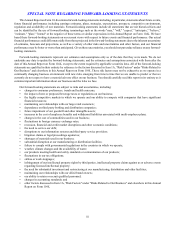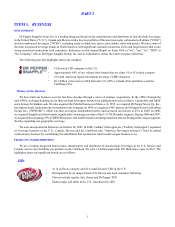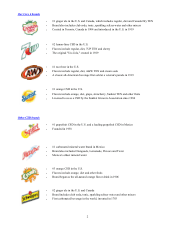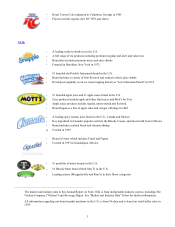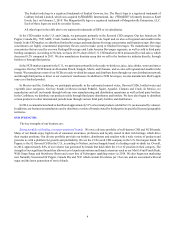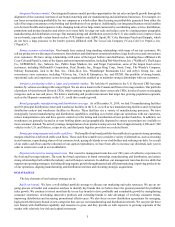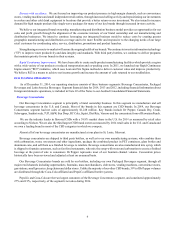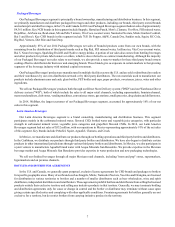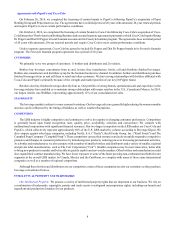Snapple 2014 Annual Report Download - page 13
Download and view the complete annual report
Please find page 13 of the 2014 Snapple annual report below. You can navigate through the pages in the report by either clicking on the pages listed below, or by using the keyword search tool below to find specific information within the annual report.
10
WAREHOUSING AND DISTRIBUTION
As of December 31, 2014, our distribution network consisted of 106 principal distribution centers and warehouses in the U.S.
and 12 principal distribution centers and warehouses in Mexico. Our warehouses are generally located at or near bottling plants
and are geographically dispersed to ensure product is available to meet consumer demand. We actively manage the sale,
merchandising and transportation of our products using a combination of our own fleet of approximately 4,500 and 1,500 vehicles
in the U.S. and Mexico, respectively, and third party logistics providers on a selected basis.
RAW MATERIALS
The principal raw materials we use in our business are aluminum cans and ends, glass bottles, PET bottles and caps, paper
products, sweeteners, juice, fruit, water and other ingredients. The cost of such raw materials can fluctuate substantially. In addition,
we are significantly impacted by changes in fuel costs due to the large truck fleet we operate in our distribution businesses.
Under many of our supply arrangements for these raw materials, the price we pay fluctuates along with certain changes in
underlying commodities costs, such as aluminum in the case of cans, natural gas in the case of glass bottles, resin in the case of
PET bottles and caps, corn in the case of sweeteners and pulp in the case of paperboard packaging. When appropriate, we mitigate
the exposure to volatility in the prices of certain commodities used in our production process through the use of forward contracts
and supplier pricing agreements. The intent of the contracts and agreements is to provide a certain level of short-term predictability
in our operating margins and our overall cost structure, while remaining in what we believe to be a competitive cost position.
Manufacturing costs for our Packaged Beverages segment, where we manufacture and bottle finished beverages, are higher
as a percentage of our net sales than our Beverage Concentrates segment as the Packaged Beverages segment requires the purchase
of a much larger portion of the packaging and ingredients. Although we have contracts with a relatively small number of suppliers,
we have generally not experienced any difficulties in obtaining the required amount of raw materials.
RESEARCH AND DEVELOPMENT
Our research and development team is composed of scientists and engineers in the U.S. and Mexico who are focused on
developing high quality products which have broad consumer appeal, can be sold at competitive prices and can be safely and
consistently produced across a diverse manufacturing network. Our research and development team engages in activities relating
to product development, microbiology, analytical chemistry, process engineering, sensory science, nutrition, knowledge
management and regulatory compliance. We have particular expertise in flavors and sweeteners, which allows us to focus our
research in areas of importance to the industry, such as new sweetener development. Research and development costs are expensed
when incurred and amounted to $18 million, $21 million and $21 million for the years ended December 31, 2014, 2013 and 2012,
respectively. These expenses are recorded in selling, general and administrative expenses in our Consolidated Statements of Income.
INFORMATION TECHNOLOGY
We use a variety of IT systems and networks configured to meet our business needs. Our primary IT data center is hosted in
Toronto, Canada by a third party provider. We also use a third party vendor for application support and maintenance, which is
based in India and provides resources offshore and onshore.
EMPLOYEES
At December 31, 2014, we employed approximately 19,000 employees.
In the U.S., we have approximately 16,000 full-time employees. We have union collective bargaining agreements covering
approximately 4,000 full-time employees. Several agreements cover multiple locations. These agreements address working
conditions as well as wage rates and benefits. In Mexico and the Caribbean, we employ approximately 3,000 full-time employees,
with approximately 2,000 employees party to collective bargaining agreements. We do not have a significant number of employees
in Canada.
We believe we have good relations with our employees.


